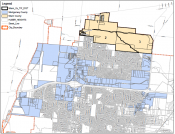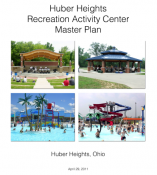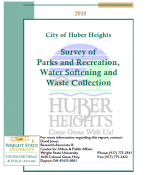It is frustrating to go through the effort of talking through an issue and getting real information on the record, only to have discredited reasoning brought up again and again. Normally, I see this on Facebook and it is the same people that continually repeat things even after I keep showing them the evidence that they were wrong. The first four minutes of the discussion found at the link above is especially interesting because the city engineer references the Facebook discussion where the video in the original article is found. You might have thought he or the assistant city manager might have watched the video to refresh their memories of the original discussion.
| Quote from the 21 November 2017 work session: Russ B: The thing is the water main was run across the property because, as we do with any other developer, property or anything else we require them to run it across the property for the next person to connect to or to extend. |
|
| … | |
| The same argument was already tried and determined to be inaccurate during the Jan 5, 2017 work session: Russ B, "I think the different issue is the fact that if it was a private developer going in there, we would have made him do it. So we're that private developer. We're going to make our self do it. Mayor McMasters, "Okay well I don't know that. I mean, I heard that we could make him do it. I'm not sure that we should have or we absolutely would. Then it goes back to my question then, 'why if we knew that we would make a private developer do this, is this $40,000 not already in the firestation budget?. Councilman Campbell, "And that not being my question or concern there's probably been developers not do this correct? Scott F, "Yes." Councilman Campbell, "And there's probably been developers that we have caused that to happen. And we have not affected the well. The well that we're talking about that's contaminated or damaged in some way. Our building of the fire station didn't do that? Scott F, "He said that he noticed it before the starting on the construction." Councilman Campbell, "Because Tom's making, from what I'm listening, this the first time I've heard this but you know if we're not making every development do this, you know so that's not policy. If we're telling Mark Avenue, is at the name of the street, something different than we're telling or doing here that that's a concern" |
|
I used an attention getting headline to get more people interested in seeing what this update was about. Unfortunately, the behavior implied in that headline cannot be eliminated as one reason why these arguments were tried again last week. It certainly is plausible, given we know from the discussion a year ago, those arguments do not hold water.
If you recall from the article found below, I was concerned because the original Jan 5, 2016 discussion ended with a recommendation to have two readings and additional discussion before committing to building the water main. Yet when it came up at the Jan 11, 2016 Council Meeting the City Manager declared that discussion led to council wanting to pass the legislation at that meeting. He also indicated he was committed to bringing back the proposal for council discussion after the bids were received. Then he failed to bring it back and essentially gave away that $40,000 without further council input.
Suppose there was no hidden agenda with either the Jan 11, 2016 actions of the City Manager. Suppose staff was not put up to re-making discredited arguments but instead made an honest mistake due to memory lapses. A proactive approach by the City Manager in making sure council was updated with correct information when it was discovered he failed in his original commitment would have gone along way in relieving some natural suspicions.
Yet there was no outreach to council this week to correct last week's misstep. Nor did he feel obligated to provide relevant updates when asked about the subject May of 2016.
———Original post ———–
Council will be discussing providing a water main for Mark Avenue. This is estimated to be a $46,000 project and staff thinks the residents on the cul de sac should pay $9,000 each toward the cost of this project. One of the arguments staff made to discourage waiving more of the cost is that, for other areas of the city, some people were assessed full costs and have been paying those assessment for years. If those people learn that other people get a cost break then they will come back to the city for a rebate.
When Tyler took up the same theme staff presented, I thought I would get the opportunity to rib him because I knew I had made that same argument earlier in the year. In that case, the city decided to give away $40,000 putting in a Main water line for just three residents. When I started the research, I was sure I would find that Tyler changed his thinking on this. Instead, I found something much more distressing, especially since one of my goals in office was to assure the cynics in my family government can operate without reproach. Here is the situation.
In January 2016 staff brought to council a proposal for the city to pay to install a $40,000 water main extension so that two houses and one business could hook up to the city water. There was a work session discussion that ended with council deciding to bring this issue back to a following work session.
At the next council meeting the city manager told us the the discussion ended with a recommendation to pass legislation to go out for a RFP that meeting. He told us after the results of the RFP were back he would bring them back to council to discuss prior to awarding the work. Instead the work was performed and the discussion never happened. None of the cost to install the main was paid for by these residents and the business did not hook up to the water line.
| The council meetings where Mark Avenue and the Firestation Water Mains are discussed total about three hours. I have cut those discussions down to the important points in the video below. It lasts about 18 Minutes. A transcript edited for clarity is to the right. |
[Join the Sept 5, 2017 work session about 20 minutes into the discussion]
Russ B. The only problem I see is if you start changing things there's a lot of people out there who are still paying an assessment. They're ten years into a twenty year assessment. Is it fair, when is it not fair to people?
Mayor McMasters: Yes good point. Yeah, good point, because you do have a lot of people, just like you said, that are sitting there calling every year saying, “hey, when is my $10,000 assessment going to go to five thousand. That’s when I'll tap in.”
Russ B. Right, but then people next door who tapped in are paying year fifteen on it. They paid all these years and then the guy next to him will get a reduced rate?
Mayor McMasters: Exactly, exactly, so yeah yes.
Councilman Lyons: Mayor, to your point that you made regarding where we go this. This might be a good test case for council to get our feet wet.
[transition to later in the Sept 5, 2017 work session]
Councilman Lyons: Is this something that you would support moving forward or you have reservations with and not want to pursue at this time?
Councilman Starline : If we go forward with this as a test case, and then we get information from that. Then we have another test case present itself and the information is different, that gives me concern. This is essentially doing things piecemeal and essentially creating the problem that Russ was actually concerned about. You know there are folks that are midway through fifteen years or twenty-year assessments. Where are we going to draw this line? And how?
To sit there and say well let's do the test case, if there's no parameters, if there's no metrics to actually determine whether the test case is successful or not and for whom is it successful, are we doing something that benefits five residents?
I have nothing against those residents but the city is supposed to be generally providing citywide services to all, not piecemeal. I have no problem with running water to any resident who wants it. What I haven't heard yet as a convincing argument that the system the way it is designed and in place now must be circumvented or otherwise an exception created.
We were told here tonight that the way to proceed is through petition and then pay an assessment. If the question is well it's going to cost them too much, what about those who have been paying 15 years of a 20-year assessment? Do we suddenly create a legal unintended consequence where suddenly we're getting claims that we should refund people some money back because we assess them 15 years out of the 20 years? I don't think that that's proper. But the question is where do we draw that line? So as if this time, I can't express an opinion on test case or not.
[Transition to Jan 5th Committee of the Whole]
Mayor McMasters: So I'm looking at the map and I see a red line from the back of the apartments through the fire station to these properties. We do not have to put that red line in there for anything that we're doing with the fire station.
Scott F: All we need for the fire station is a service line.
Mayor McMasters: Okay so that red line, that $40,000 there that needs to be put in, we don't need to do for any project that we're doing?
Scott F: No we don't need to.
Mayor McMasters: Okay so if these residents wanted water normally and they didn't have it, it looks like there is a red line on old Troy pike they would tie into. We would extend the main from old Troy pike to that business down along to the other three residents that are down there and then you would assess them all accordingly.
Scott F: There's a main on the other side of old Troy pike. They could tap into, bore under the streets, and have a very long service line which then get into pressure issues and those kinds of things for longer runs.
Mayor McMasters: Sure, sure but it would cost them a lot more than $40,000 as a group to get that water. Okay so yes just because it's our property line. That $40,000 is a lot less than the 70 or 80 thousand dollars that they'd have to split between them if they were doing it normally. Right so we don't need to build that line why would we build that line?
Scott F: So it'll get more customers on the line and provide water service to our residents.
[Transition]
Mayor McMasters: Help me out in front of Mark Avenue would you put a service line in for the houses of Mark?
Scott F: We would put a water main extension on the street.
Mayor McMasters: Okay, so if you took a water main from old Troy Pike and put it all the way out to that last business then they would have enough water pressure?
Scott F: It'd be a longer span and cost more.
Mayor McMasters: Right but you would assess it against the houses that were that wanted it?
Scott F: and it would go across some that already have water.
Mayor McMasters: There's houses that already have water on that road?
Scott F: To the south of the carwash into the South there. They're on the water system already, so to extend from further to the South the others have their own properties. They already have service lines.
Mayor McMasters: They have service lines, yeah okay.
Councilman Lyons: Mayor this is off topic and it's already been discussed a lot, but your point on Mark Avenue, that might be a specific discussion to have another meeting in a couple weeks. Because I believe with that extension it would be too expensive for the residents that live at the end of Mark Avenue. My understanding of the City’s past practices is to charge the residents for the cost of the line. With just a few houses, three or four, I think that the expense is exorbitant. But council does have the authority to declare a hardship and then still have the citizens pay for a portion of that and the city could then use the water fund money or sewer fund money to pick up the rest of the cost.
Mayor McMasters: I need to go talk to the residents again to see exactly what they were willing to pay for or not willing to pay for. I'm certain that at least one of them told me they'd.
(ED) I'll take your water and add two more.
Mayor McMasters: That they were willing to pay for it accept they just couldn't get the last person to do it and the city didn't want to do it unless it went all the way to the end the road. And so you wouldn't be able to assess it for the one at the end of the road.
Russ B. I believe there's one or two people on there that have wells that work fine and they didn't want to tap into the water main so it became an issue of who's gonna pay for it. If only three people there's, only I think five houses, that don't have service, so whether the others would cover the cost for three houses, I think it just wasn't feasible for them to do it.
Mayor McMasters: Yes, then but we'd have to speak to them. My point in bringing them up was here was we're gonna pay $40,000 for this proposal.
Councilman Lyons: I happen to know as much information on that as you do because they've talked to me as well so what we can.
Mayor McMasters: I don't know, my point is, I don't know that it's good practice to get into paying $40,000 for things that we expect other residents to pay for. I don't think that we can afford to pay all the costs for all the people that that need a lot of these services. And quite frankly, I really haven't heard any reason why we should be paying for it now, unless we would say that that we actually are the cause of the problems with their wells. But other than that, I don't know why we would we would consider paying for it. go ahead.
Councilman Lyons: Again this is getting off topic but I can give you reason there might be a discussion for another committee.
Mayor McMasters: No go ahead. I mean I would like to know why. Why we should pick up this cost because I don't believe that we would be paying for any other group of citizens.
Councilman Lyons: Well the group of citizens, I believe, are still going to pay a cost and a share of this now. I mean the red line, I understand the City will pick up that, but we're extending services. So what's a local government to do but to help the residents receive services? Basic services, water. That's my position. It may be a philosophical difference and I think they should be paying for their share I think we require all citizens to pay for laterals and the city extends the water mains. The main lines.
Mayor McMasters: No that's the problem with Mark. If we were put in the main line on Mark Avenue those people would happily tie into the laterals.
Councilman Lyons: But we would only be putting that in for five houses.
Mayor McMasters: You are putting them in for three here.
Councilman Lyons: Its expense, I mean it's a cost. I would do it for Mark Avenue myself but I don't get that choice.
Mayor McMasters: I wish we could do it for everybody but the thing is when you start doing, when you start doing it for some, and you can't do it for others, how do you pick and choose. So right now, I'm trying to.
Councilman Lyons: So you pick a plan and do a little bit at a time.
Mayor McMasters: You know because I'd rather see you put 1.5 and 40,000 into doing another half a mile of roads.
Russ B. I think the different issue is the fact that if it was a private developer going in there we would have made him do it. So we're that private developer, we're going to make ourself do it.
Mayor McMasters: Okay well I don't know that I. I mean I heard that we could make a private developer do it. I'm not sure that we should have, or we absolutely would. Then it goes back to my question. Why, if we knew that we would make a private developer do this, is this $40,000 not already in the fire station budget? Because if it would be something that we would be making people do, that $40,000 have already been in the fire station the budget. Because we knew that we're going to be forced to do it.
[Transition to later in the same meeting]
Councilman Campbell: Here is my question or concern. There's probably been developers not required to do this correct?
Scott F: yes.
Councilman Campbell: And there's probably been developers that we have caused that to happen. And, we have not affected the well. That the well that we're talking about, that's contaminated or damaged in some way, our building of the fire station didn't do that.
Scott F: He said that he noticed that before we started under construction.
Councilman Campbell: Do we have in the packet what the annual return would be right now on additional customers.
Scott F: no, that's not in there.
Councilman Campbell: That's something you can provide us?
Scott F: (addressing another party) Okay this would not be adding sewer to this it's just water
Councilman Campbell: and at some point there'd be a payoff
Scott F: yeah
Councilman Campbell: It might be 20 years right in that one information I'd like to see.
Scott F: I can provide it
Councilman Campbell: Because Tom's making, from what I'm listening to. This the first time I've heard this, but you know, if we're not making every development do this, you know, so that's not policy. If we're telling Mark Avenue, is at the name of the street, something different than we're telling those over here. That that's a concern. Is there a time frame and I know someone's Wells messed up but yeah.
Scott F: There is the cost/benefit doing it while the fire stations going on as well.
Mayor McMasters: So one of my other points, if they wanted the water run from Old Troy to the properties at the end, they could do that, but it would just cost a lot more than $40,000. So therefore, it's to their benefit to ask us to do this and then pay the $40,000 cost instead of waiting till later when it would cost 70 or 80 thousand dollars. So, if they came to the city with $40,000 it'll be cheaper for them and it wouldn't cost us $40,000.
Scott F: Actually, this could also save us money on the shorter service line because we would be tying into a closer point on a new main.
(AS) But you would also pay part of that 40,000 for the service line right? And it's getting a water main down and give you water.
Mayor McMasters: The service line would cost us some money.
(AS) The service line is already going to cost you money.
Scott F: The service line is already budgeted and we could actually save money.
Mayor McMasters: Yeah okay, so we can negotiate so that we pay some of the costs and people that want the Main pay some of the costs.
[Transition to later in the same meeting]
Councilman Starline : Scott, what if any policy do we have currently set with regard to the discretionary of making a developer do this or not? We've talked a little bit here on this topic about it being discretionary or that it's optional. Do we have anything that helps either this council or, I could imagine this going to Planning Commission, help us decide on this.
Scott F: We look at what the next property is. An open farm field, yes, we will require them to extend to that property lines because, the thought is it's going to develop one day. But those kinds of situations, if the property next to it is already developed, then there's no reason to extend to that.
Councilman Starline: If I heard earlier, I haven't saw it in the packet, but some of the property know wait, that's on the Mark Avenue. All three affected properties, all four affected properties, want to take advantage of this okay. There's one thing I was thinking about, is for lighting districts and other things, we have to require a certain percentage of the affected households sign on before we would consider going forward with this. This one is a hundred percent, for lack of a better word, buy in on it.
Okay, why was this area of properties not previously at some point brought into water? Is it because up to a certain point, they've actually wanted wells and well water and the cost, or lack of cost to it, now they're wells are insufficient, they're now looking to benefit?
Scott F: We do not require somebody to tap in to our water, if they have a working well. So if the water line was put in with Old Troy pike years ago, I couldn't give you a good answer about why they decided not to.
[Transition to the end of the same meeting]
Mayor McMasters: Well, I recommend that we take it to the first reading and come back to the committee with recommendations and give us some time to think about it and see what our positions are as we go onto the next couple readings. Unless council has any other suggestions?
All right so we'll see this back in the committee of the whole work session.
[Transition to Jan 11, 2016]
(RS){prior to the start of this recording the City manager indicates that he had other conversations where he determined subsequent readings were not require. Then promised to bring back the bids to council.} When the actual bid itself comes back, at that time, generally we also ask those readings to be waived because the scope of a time frame of getting that bid and that work put together. So that is our ask, and the result of discussion at work session.
[Transition to Council Remarks]
Councilman Starline: Typically I like to see more readings versus not, but the other thing is this is to take something out to bid and then bid will come back for council review, that is, I think a much more substantive review.
| Though the recommendation from the Committee of the Whole was to go to additional readings, the City Manager tells us we decided to waive the RFP readings and he would bring back the proposals once the bids were received. |













 Edited
Edited